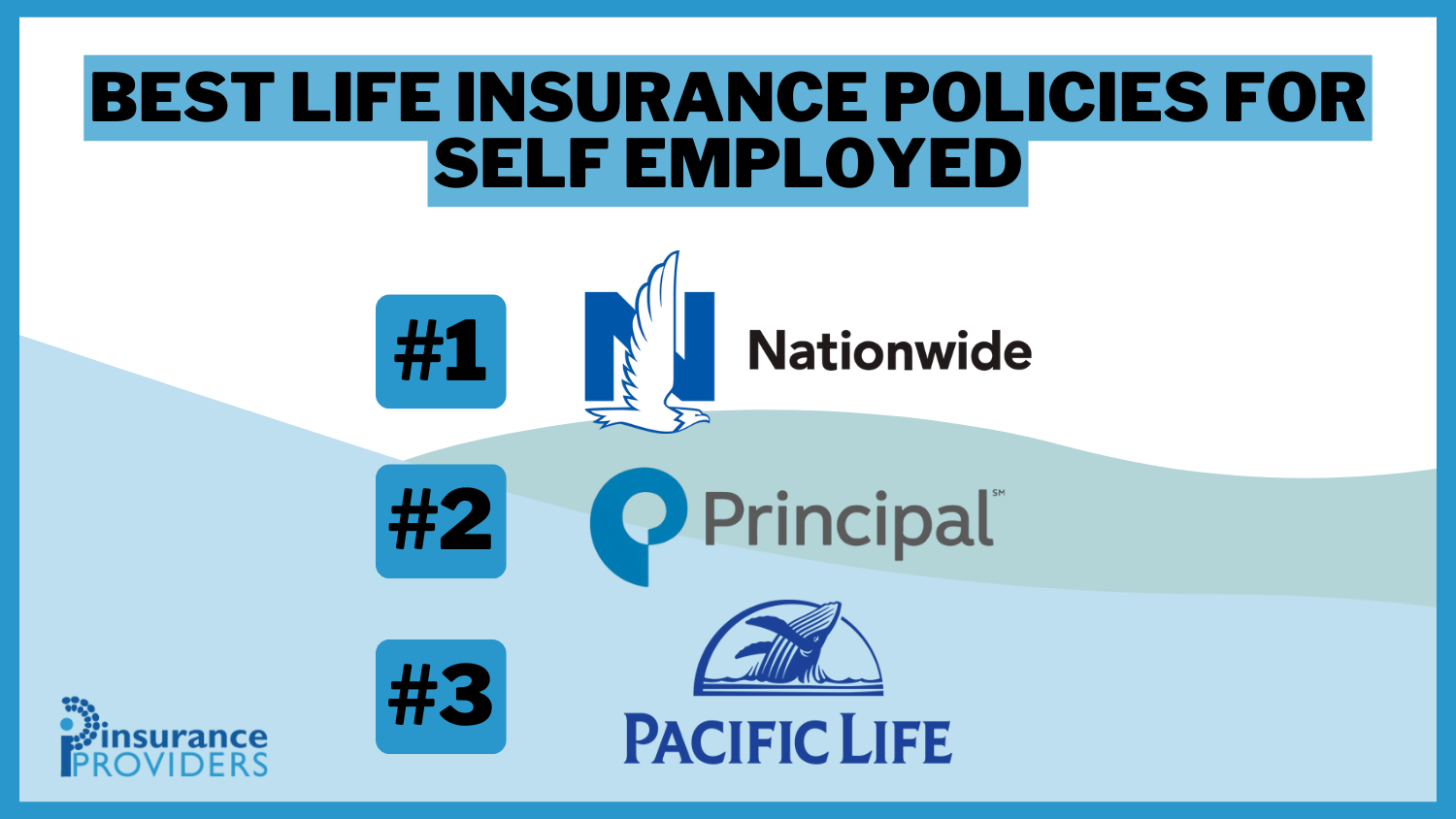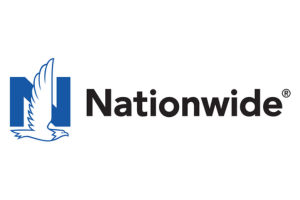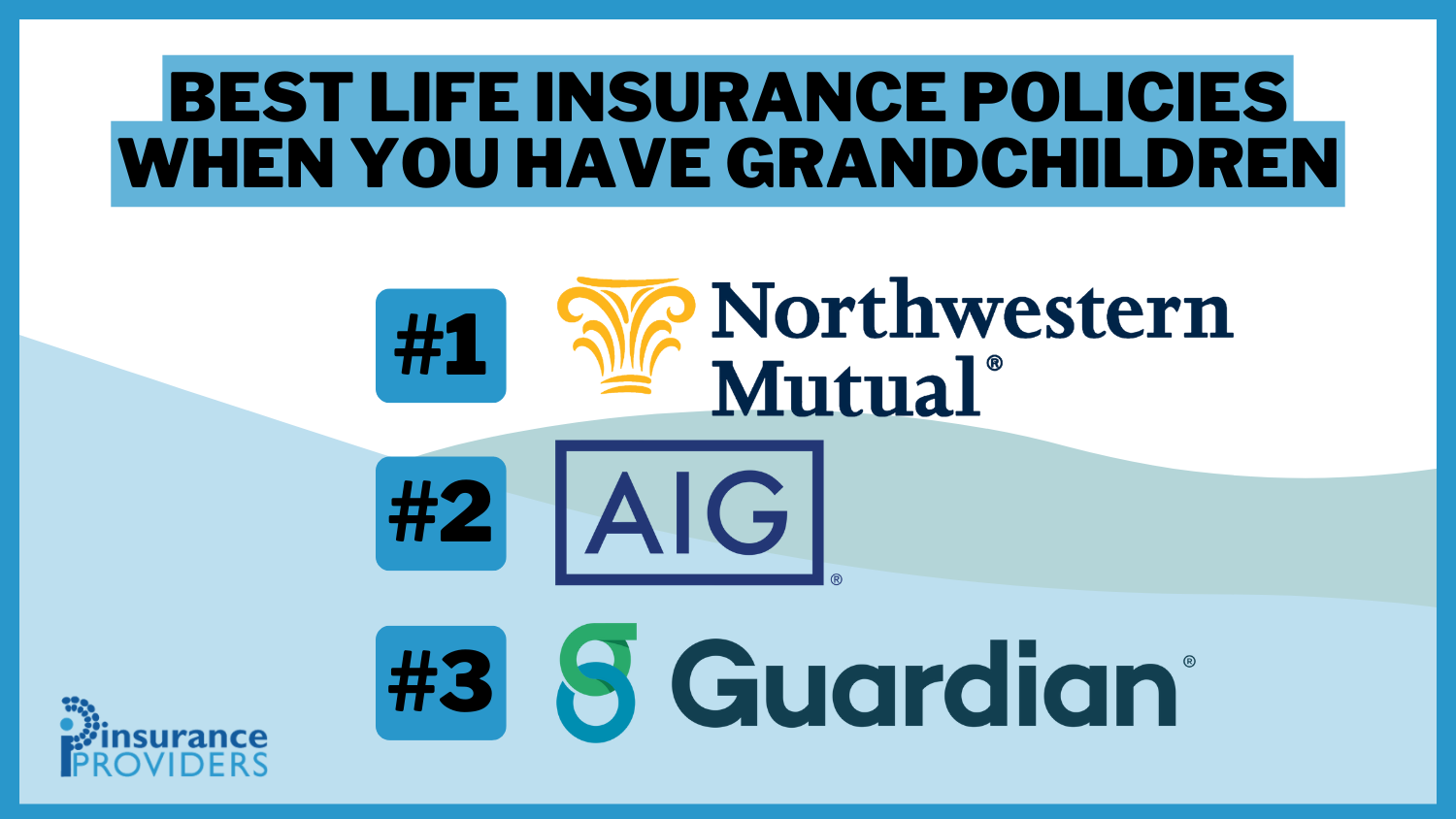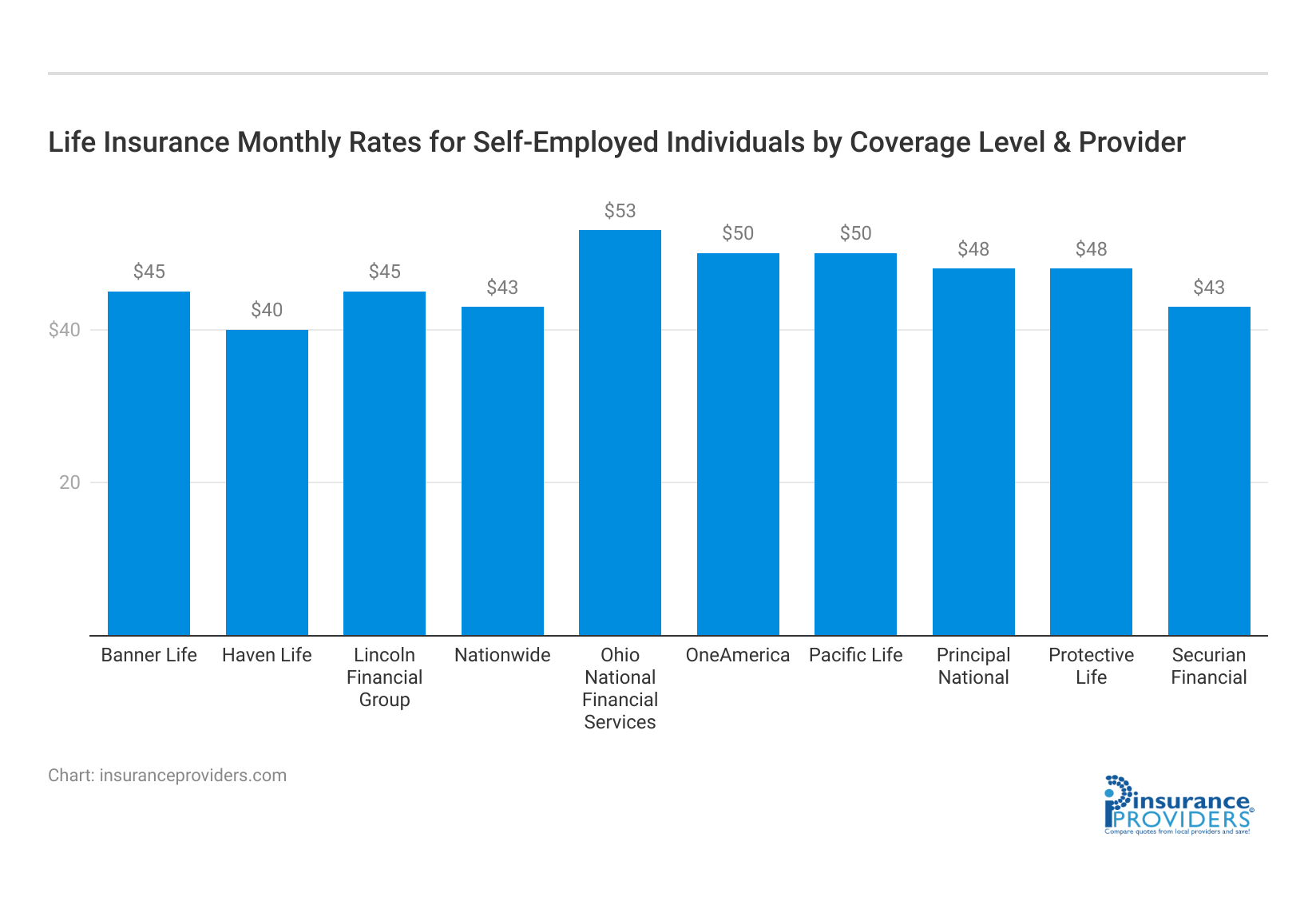Best Life Insurance Policies for Self Employed in 2026 (Top 10 Companies)
Find the best life insurance policies for self-employed, featuring top providers like Nationwide, Principal National, and Pacific Life. These companies excel due to competitive rates and tailored coverage, providing crucial financial security.
Read more Secured with SHA-256 Encryption





Table of Contents
Table of Contents


Licensed Insurance Agent
Jeffrey Manola is an experienced life insurance agent who founded TopQuoteLifeInsurance.com and NoMedicalExamQuotes.com. His mission when creating these sites was to provide online consumers searching for life insurance with the most affordable term life insurance, permanent life insurance, no medical exam life insurance, and burial insurance. Not only does he strive to provide consumers with t...
Jeffrey Manola


Licensed Insurance Agent
Daniel Walker graduated with a BS in Administrative Management in 2005 and has run his family’s insurance agency, FCI Agency, for over 15 years (BBB A+). He is licensed as an insurance agent to write property and casualty insurance, including home, life, auto, umbrella, and dwelling fire insurance. He’s also been featured on sites like Reviews.com and Safeco. To ensure our content is accura...
Daniel Walker
Updated February 2024
Company Facts
Average Monthly Rate For Good Drivers
A.M. Best Rating
Complaint Level
Pros & Cons
Company Facts
Average Monthly Rate For Good Drivers
A.M. Best Rating
Complaint Level
Pros & Cons
Discover the best life insurance policies for self-employed with top providers like Nationwide, Principal National, and Pacific Life. With a focus on tailored coverage and competitive rates, we delve into various insurance providers, ultimately spotlighting Nationwide as the standout choice, offering comprehensive protection and affordability.
For self-employed individuals, life insurance, including a review of Principal National Life Insurance, is an important consideration for securing their financial future and protecting their loved ones (read our “Principal National Life Insurance Company Review” for more information).

Our Top 10 Best Companies: Best Life Insurance Policies For Self Employed
| Company | Rank | See Pros/Cons | Self-Employed Discount | Bundle Discount | Best For |
|---|---|---|---|---|---|
 | #1 | Nationwide | Up to 15% | Up to 20% | SelfBiz Savings |
| #2 | Principal National | Up to 18% | Up to 25% | Entrepreneurs Advantage | |
 | #3 | Pacific Life | Up to 12% | Up to 18% | Coverage Discount |
| #4 | Lincoln Financial Group | Up to 15% | Up to 20% | Investment Bonus | |
| #5 | Haven Life | Up to 10% | Up to 15% | QuickApp Savings | |
| #6 | Ohio National Financial | Up to 15% | Up to 22% | Estate Planner | |
| #7 | Banner Life | Up to 12% | Up to 18% | Protective Shield | |
| #8 | Protective Life | Up to 12% | Up to 18% | Comprehensive Coverage | |
| #9 | OneAmerica | Up to 15% | Up to 22% | Business Care | |
| #10 | Securian Financial | Up to 10% | Up to 15% | Guard Savings |
Although it may not always be the first item on the to-do list, having a comprehensive life insurance policy, such as the offerings from Principal National Life Insurance Company, can provide invaluable peace of mind.
This article will discuss the importance of life insurance for the self-employed, the risks of not having it, the different types of life insurance policies available, and the top policies to consider. We will also delve into the factors to consider when choosing the best life insurance policy for your unique needs.
#1 – Nationwide: SelfBiz Savings
Nationwide stands out as the top choice for self-employed individuals, offering comprehensive protection and affordability in life insurance policies.Dani Best Licensed Insurance Producer
Pros
- Self-employed discount: Offers a competitive self-employed discount of up to 15%.
- Bundle discount: Provides a bundle discount of up to 20% for combining multiple insurance policies.
- SelfBiz savings: Ideal for self-employed individuals, offering specialized savings and coverage options.
Cons
- Limited information: Limited information available regarding specific policy features and options.
- Customer service variability: Customer reviews indicate variability in customer service quality.
Read more: National Life Insurance Company Review
Free Life Insurance Comparison
Compare Quotes From Top Companies and Save
Secured with SHA-256 Encryption
#2 – Principal National: Entrepreneurs Advantage
Pros
- Self-employed discount: Offers a substantial self-employed discount of up to 18%.
- Bundle discount: Provides a bundle discount of up to 25% for comprehensive coverage.
- Entrepreneurs advantage: Tailored for entrepreneurs with specialized advantages.
Cons
- Limited reviews: Limited online customer reviews available.
- Pricing variability: Some policies may be priced higher than competitors.
Read more: Principal National Life Insurance Company Review
#3 – Pacific Life: Coverage Discount
Pros
- Self-employed discount: Offers a self-employed discount of up to 12%.
- Bundle discount: Provides a bundle discount of up to 18% for combined policies.
- Coverage discount: Known for providing comprehensive coverage options.
Cons
- Limited information: Limited information on specific policy features and riders.
- Customer service delays: Customer service reviews suggest occasional delays.
Read more: Pacific Life Insurance Company Review
#4 – Lincoln Financial Group: Investment Bonus
Pros
- Self-employed discount: Offers a competitive self-employed discount of up to 15%.
- Bundle discount: Provides a bundle discount of up to 20% for combining policies.
- Investment bonus: May offer investment-related bonuses for policyholders.
Cons
- Complex policy structures: Complex policy structures that may require thorough understanding.
- Communication variability: Customer reviews indicate variability in communication effectiveness.
Free Life Insurance Comparison
Compare Quotes From Top Companies and Save
Secured with SHA-256 Encryption
#5 – Haven Life: QuickApp Savings
Pros
- Self-employed discount: Offers a self-employed discount of up to 10%.
- Bundle discount: Provides a bundle discount of up to 15% for combined policies.
- Quickapp savings: Stands out for a streamlined application process and potential savings.
Cons
- Limited policy variety: Limited variety in policy types compared to other providers.
- Health condition limitations: May not cater to individuals with specific health conditions.
#6 – Ohio National Financial Services: Estate Planner
Pros
- Self-employed discount: Offers a competitive self-employed discount of up to 15%.
- Bundle discount: Provides a bundle discount of up to 22% for comprehensive coverage.
- Estate planner: Known for specialized services for estate planning.
Cons
- Limited online accessibility: Limited online accessibility for obtaining quotes.
- Restrictive underwriting: Some policies may have more restrictive underwriting criteria.
#7 – Banner Life: Protective Shield
Pros
- Self-employed discount: Offers a self-employed discount of up to 12%.
- Bundle discount: Provides a bundle discount of up to 18% for combined policies.
- Protective shield: Known for comprehensive coverage options for added protection.
Cons
- Limited online service: Limited online customer service options.
- Higher pricing: Policies may be priced slightly higher compared to competitors.
Read more: Banner Life Insurance Company Review
Free Life Insurance Comparison
Compare Quotes From Top Companies and Save
Secured with SHA-256 Encryption
#8 – Protective Life: Comprehensive Coverage
Pros
- Self-employed discount: Offers a self-employed discount of up to 12%.
- Bundle discount: Provides a bundle discount of up to 18% for combined policies.
- Comprehensive coverage: Known for offering comprehensive coverage options.
Cons
- Claims processing delays: Customer reviews indicate occasional delays in claims processing.
- Stricter underwriting: Some policies may have stricter underwriting criteria.
Read more: Protective Life Insurance Company Review
#9 – OneAmerica: Business Care
Pros
- Self-employed discount: Offers a competitive self-employed discount of up to 15%.
- Bundle discount: Provides a bundle discount of up to 22% for combined policies.
- Business care: Tailored for business owners with specialized care options.
Cons
- Limited reviews: Limited online customer reviews available.
- Policy customization: Policy customization may require more detailed communication.
#10 – Securian Financial: Guard Savings
Pros
- Self-employed discount: Offers a self-employed discount of up to 10%.
- Bundle discount: Provides a bundle discount of up to 15% for combined policies.
- Guard savings: Offers specialized savings under the ‘Guard Savings’ program.
Cons
- Limited information: Limited information on specific policy features.
- Claims processing challenges: Customer reviews suggest occasional challenges in claims processing.
Free Life Insurance Comparison
Compare Quotes From Top Companies and Save
Secured with SHA-256 Encryption
Navigating Life Insurance Costs for Self-Employed Individuals
When it comes to securing life insurance, self-employed individuals often find themselves navigating the complexities of coverage options and costs. The monthly rates can vary significantly depending on factors such as the insurance company, coverage type, and individual circumstances.
Average Monthly Life Insurance Rates for Self Employed
| Insurance Company | Minimum Coverage | Full Coverage |
|---|---|---|
| Nationwide | $43 | $88 |
| Principal National | $48 | $95 |
| Pacific Life | $50 | $103 |
| Lincoln Financial Group | $45 | $93 |
| Haven Life | $40 | $85 |
| Ohio National Financial Services | $53 | $108 |
| Banner Life | $45 | $95 |
| Protective Life | $48 | $98 |
| OneAmerica | $50 | $105 |
| Securian Financial | $43 | $90 |
Nationwide, offering a minimum coverage option at $43 per month provides a budget-friendly entry point. Meanwhile, the more extensive full coverage plan from Nationwide stands at $88 monthly, catering to those prioritizing comprehensive protection.
Principal National follows suit, with a $48 minimum coverage rate and a slightly higher $95 for full coverage, allowing flexibility based on individual preferences and financial considerations.
Understanding the Importance of Life Insurance for the Self-Employed
When you are self-employed, your income and financial stability often depend solely on yourself. Unlike employees who may have access to group life insurance through their employer, self-employed individuals must take proactive measures to protect their loved ones in the event of unexpected circumstances. Life insurance acts as a safety net, ensuring that your family will be financially supported even after you are gone.
But what exactly is life insurance? It is a contract between you and an insurance company, where you pay regular premiums in exchange for a lump sum payment, known as the death benefit, to be paid to your beneficiaries upon your death. This financial protection can provide peace of mind and help your family maintain their standard of living.
Life insurance is particularly crucial for self-employed individuals. Without the safety net of an employer-provided policy, you are solely responsible for securing your family’s financial future. By having a life insurance policy in place, you can rest easy knowing that your loved ones will be taken care of financially.
Why Self-Employed Individuals Need Life Insurance
Self-employed individuals should not underestimate the importance of life insurance. By having a policy in place, you can provide financial security for your family in case of your untimely demise. Life insurance can help cover outstanding debts, mortgage payments, childcare costs, and even funeral expenses.
Imagine this scenario: you are the sole breadwinner of your family, and your income supports not only your household expenses but also your children’s education and your partner’s retirement plans. If something were to happen to you, your family would be left in a precarious financial situation. However, with a life insurance policy, your loved ones would receive a lump sum payment, allowing them to pay off debts, maintain their lifestyle, and work towards their long-term goals.
Moreover, life insurance can also serve as an inheritance for your loved ones. It can provide them with the means to start a new business, invest in their education, or even secure their own financial future. By investing in life insurance, you are investing in the well-being and prosperity of your family.
Read more: What are the benefits of having life insurance?
The Risks of Not Having Life Insurance When Self-Employed
When self-employed individuals neglect to obtain life insurance, they expose their loved ones to significant financial risks. In the event of an unexpected death, the burden of unpaid debts, loss of income, and other expenses can be overwhelming for the surviving family members. This can lead to financial instability and added stress during an already challenging time.
Consider the following scenario: you are a self-employed business owner with significant business debts. If you were to pass away unexpectedly, your family would be left with the responsibility of managing and paying off those debts. Without a life insurance policy to cover these financial obligations, your loved ones may be forced to sell the business or other assets to settle the debts, potentially leaving them with little to no financial security.
Furthermore, funeral expenses can be a significant financial burden for families. The cost of a funeral, including the casket, burial plot, and memorial services, can quickly add up to thousands of dollars. Without life insurance, your family may struggle to cover these expenses, adding additional stress to an already emotionally challenging time.
It’s important to remember that life insurance isn’t just about protecting your loved ones financially; it’s about providing them with the support and stability they need during a difficult time. By securing a life insurance policy, you are ensuring that your family can focus on healing and rebuilding their lives without the added worry of financial hardship.
Types of Life Insurance Policies
Now that we understand the importance of life insurance for the self-employed, let’s explore the different types of policies available. Life insurance policies generally fall into three main categories: term, whole life, and universal life insurance.
Term Life Insurance
Term life insurance provides coverage for a specific period, usually ranging from 10 to 30 years. It is a popular choice for self-employed individuals due to its affordability and flexibility. This type of policy offers a death benefit to beneficiaries if the policyholder passes away during the term. It does not accumulate cash value, making it a straightforward and cost-effective option.
When considering term life insurance, it’s important to understand the various factors that can affect the premium rates. These factors include the policyholder’s age, health condition, occupation, and lifestyle choices. Insurance companies assess these factors to determine the level of risk associated with providing coverage. For example, individuals with risky occupations or certain pre-existing medical conditions may have higher premiums compared to those with lower risk profiles.
Additionally, term life insurance policies often come with the option to convert them into permanent policies, such as whole life or universal life insurance. This conversion feature allows policyholders to extend their coverage beyond the initial term without having to undergo a new medical examination or provide evidence of insurability. It provides flexibility for self-employed individuals who may want to secure lifelong coverage in the future.
Whole Life Insurance
Whole life insurance is a permanent policy designed to provide lifelong coverage as long as premiums are paid. In addition to the death benefit, whole life insurance policies also have a cash value component that grows over time. This cash value can be accessed through policy loans or withdrawals, making it a potential source of emergency funds in the future. Although whole life insurance tends to have higher premiums, it offers the benefit of long-term financial security.
One of the advantages of whole life insurance is the ability to accumulate cash value over time. The cash value grows based on a predetermined interest rate set by the insurance company. This feature allows policyholders to build a financial asset that can be utilized for various purposes, such as supplementing retirement income, funding education expenses, or even starting a business. The cash value component also provides a degree of financial flexibility, as policyholders can borrow against it or use it to pay premiums if needed.
Furthermore, whole life insurance policies often come with additional riders or add-ons that can enhance the coverage. These riders may include options for accelerated death benefits, which allow policyholders to access a portion of the death benefit if diagnosed with a terminal illness. Other riders may provide coverage for critical illnesses, accidental death, or even waiver of premium, which ensures that premiums are waived in the event of disability.
Universal Life Insurance
Universal life insurance combines the death benefit protection of a term policy with a cash value component similar to whole life insurance. The key difference is the flexibility it provides regarding premium payments and death benefit amount. With universal life insurance, self-employed individuals have the option to adjust their premium payments and death benefit to suit their changing financial circumstances. This can be particularly beneficial for those with fluctuating income or those who anticipate changing insurance needs in the future.
One of the unique features of universal life insurance is the ability to change the premium payments within certain limits. Policyholders can choose to pay more or less than the scheduled premium, depending on their financial situation. This flexibility allows self-employed individuals to adapt their insurance coverage to align with their income fluctuations. For example, during periods of higher income, policyholders may opt to pay higher premiums to build cash value more quickly. On the other hand, during leaner times, they can reduce or even suspend premium payments, as long as there is sufficient cash value to cover the cost of insurance.
Another advantage of universal life insurance is the potential to accumulate cash value on a tax-deferred basis. The cash value grows based on the performance of the underlying investment options chosen by the policyholder. This investment component provides an opportunity for potential growth, although it also comes with some level of risk. Policyholders have the flexibility to allocate their premium payments into different investment options, such as stocks, bonds, or money market funds, based on their risk tolerance and financial goals.
Furthermore, universal life insurance policies often offer a variety of riders that can be added to customize the coverage. These riders may include options for long-term care benefits, which can help cover the costs of nursing home care or in-home assistance. Other riders may provide additional coverage for accidental death, disability income, or even a return of premium, which guarantees a refund of the premiums paid if the policyholder outlives the policy term.
Free Life Insurance Comparison
Compare Quotes From Top Companies and Save
Secured with SHA-256 Encryption
Top Life Insurance Policies for Self-Employed Individuals
Now that we have explored the different types of life insurance available, let’s examine some of the top policies suited for self-employed individuals.
Being self-employed comes with its own set of challenges, including the need for financial security and protection. Life insurance is an essential tool for self-employed individuals to ensure that their loved ones are taken care of in the event of their untimely passing. Let’s delve into some of the best life insurance policies available specifically tailored for the self-employed.
Review of Best Term Life Insurance Policies
When considering term life insurance policies, several reputable companies stand out.
Company A offers competitive rates and flexible coverage options to accommodate various needs. Their policies are designed to provide financial protection for a specific period, typically ranging from 10 to 30 years. With Company A, self-employed individuals can enjoy the peace of mind knowing that their loved ones will be taken care of in the event of their passing.
Company B, on the other hand, provides excellent customer service and a simplified application process, making it ideal for busy self-employed individuals. Their policies offer the flexibility to choose the coverage amount and term length that suits individual needs. With Company B, self-employed individuals can easily navigate the process of obtaining life insurance without adding unnecessary stress to their already busy lives.
Last but not least, Company C offers a range of optional riders such as critical illness coverage and disability benefits to enhance the policy’s overall value. These additional benefits provide an extra layer of protection, ensuring that self-employed individuals are covered in various unforeseen circumstances.
Review of Best Whole Life Insurance Policies
For self-employed individuals seeking lifelong coverage and potential cash value accumulation, Company X is known for its reliable whole life insurance policies. These policies not only provide a death benefit but also build cash value over time. With Company X, self-employed individuals can enjoy the benefits of both protection and potential growth of their policy’s value.
Company Y offers a variety of dividend options, allowing policyholders to maximize the growth potential of their cash value. Dividends can be used to increase the policy’s death benefit, accumulate in a cash value account, or be withdrawn by the policyholder. With Company Y, self-employed individuals can have more control over their policy’s cash value and tailor it to their specific financial goals.
Company Z, on the other hand, provides comprehensive whole life insurance coverage with the added advantage of guaranteed cash value accumulation. This means that regardless of market conditions, the policyholder’s cash value will continue to grow over time. For self-employed individuals looking for stability and long-term financial protection, Company Z’s whole life insurance policies offer a reliable solution.
Review of Best Universal Life Insurance Policies
When it comes to universal life insurance, self-employed individuals have several options to choose from.
Company P offers flexible premium payment options and adjustable death benefit amounts to cater to changing needs. This flexibility allows self-employed individuals to adapt their life insurance coverage to their evolving financial situation. Whether they need to increase or decrease their coverage or adjust their premium payments, Company P’s universal life insurance policies provide the necessary flexibility.
Company Q provides competitive interest rates on the cash value component, ensuring potential growth over time. The cash value in a universal life insurance policy can be invested, and Company Q offers attractive interest rates to help self-employed individuals grow their policy’s cash value. This growth can provide additional financial security and flexibility in the future.
Lastly, Company R specializes in innovative universal life insurance policies that provide additional benefits such as long-term care coverage and wealth transfer capabilities. These policies go beyond traditional life insurance, offering self-employed individuals the opportunity to protect their assets and plan for their future healthcare needs.
Choosing the right life insurance policy as a self-employed individual is crucial for financial security and peace of mind. Whether it’s term life, whole life, or universal life insurance, there are options available that cater specifically to the unique needs of self-employed individuals. Take the time to evaluate your financial goals and consult with a trusted insurance advisor to find the best life insurance policy that suits your needs.
Factors to Consider When Choosing a Life Insurance Policy
As a self-employed individual, several factors should influence your decision when selecting a life insurance policy tailored to your specific needs.
Assessing Your Financial Needs
Before purchasing a policy, it is essential to evaluate your financial situation. Consider your outstanding debts, current expenses, future financial goals, and the needs of your dependents. This assessment will help determine how much coverage is necessary to provide adequate protection.
Understanding Policy Terms and Conditions
Thoroughly review and understand the terms and conditions of any life insurance policy you are considering. Pay attention to details such as premium payment frequency, renewal options, possible exclusions, and any limitations or restrictions on coverage benefits.
Comparing Premium Rates
Compare premium rates from multiple insurance providers to ensure you are getting the best value for your money. It is important to note that the cheapest policy may not always be the most suitable option. Consider the comprehensiveness of coverage and the reputation of the insurance company when making your final decision.
In conclusion, life insurance is a crucial consideration for self-employed individuals. It provides a safety net for their loved ones and ensures financial stability in challenging times. Understanding the importance of life insurance, the risks of not having it, and the different types of policies available is essential for making informed decisions. By reviewing the top life insurance policies for self-employed individuals and considering factors such as financial needs, policy terms, and premium rates, you can choose the best life insurance policy tailored to your unique circumstances. Remember, investing in life insurance is investing in the future security of you and your loved ones.
Case Studies: Life Insurance Policies for Self Employed
Case Study 1: Sarah’s Story
Sarah, a freelance graphic designer, recently became a mother and realized the importance of securing her family’s financial future. She opted for Nationwide’s SelfBiz Savings policy, attracted by its comprehensive protection and affordability tailored for self-employed individuals.
Unfortunately, Sarah was diagnosed with a critical illness shortly after purchasing the policy. Thanks to the critical illness coverage provided by Nationwide, she received a lump sum payment that helped cover her medical expenses and maintain her family’s standard of living during her recovery.
Case Study 2: David’s Dilemma
David, a freelance software developer, was concerned about the financial security of his family in case of his unexpected demise. He chose Principal National’s Entrepreneurs Advantage policy due to its substantial self-employed discount and tailored benefits for entrepreneurs.
Tragically, David passed away in a car accident, leaving behind significant business debts and financial obligations. Thanks to the comprehensive coverage provided by Principal National, his family received the death benefit, allowing them to pay off debts, cover living expenses, and secure their future despite the unexpected loss.
Case Study 3: Emily’s Emergency
Emily, a self-employed writer, understood the importance of having reliable life insurance coverage, especially as a single parent. She opted for Pacific Life’s Coverage Discount policy, known for its comprehensive coverage options. During a family vacation, Emily suffered a severe injury in a hiking accident, resulting in a long recovery period and the inability to work.
The disability benefits provided by Pacific Life’s policy offered her financial support during her recovery, ensuring that she could focus on healing without worrying about financial instability.

Frequently Asked Questions
What are the advantages of having life insurance for self-employed individuals?
Having life insurance as a self-employed individual provides financial protection for your loved ones in case of your untimely demise. It can help cover funeral expenses, outstanding debts, and provide income replacement for your family.
What types of life insurance policies are suitable for self-employed individuals?
Self-employed individuals can consider different types of life insurance policies such as term life insurance, whole life insurance, or universal life insurance. The choice depends on their specific needs, budget, and long-term financial goals.
How much life insurance coverage do self-employed individuals need?
The amount of life insurance coverage needed for self-employed individuals depends on various factors like their income, outstanding debts, future financial obligations, and the needs of their dependents. It is advisable to evaluate these factors carefully or consult with a financial advisor to determine an appropriate coverage amount.
Can self-employed individuals deduct life insurance premiums as a business expense?
In general, life insurance premiums are not tax-deductible for self-employed individuals unless the policy is considered a key person insurance or part of a business continuation plan. It is recommended to consult with a tax professional to understand the specific tax implications in your situation.
Is it possible to change or upgrade the life insurance policy as a self-employed individual?
Yes, it is possible to change or upgrade your life insurance policy as a self-employed individual. However, any changes may be subject to the insurer’s terms and conditions, and it is important to review the policy details, potential costs, and implications before making any modifications.
Can self-employed individuals get life insurance if they have pre-existing medical conditions?
Yes, self-employed individuals with pre-existing medical conditions can still obtain life insurance coverage. However, the availability, terms, and premiums may vary depending on the severity of the condition and the insurer’s underwriting guidelines. It is advisable to work with an experienced insurance agent who can help find suitable options.
Get a FREE Quote in Minutes
Insurance rates change constantly — we help you stay ahead by making it easy to compare top options and save.







